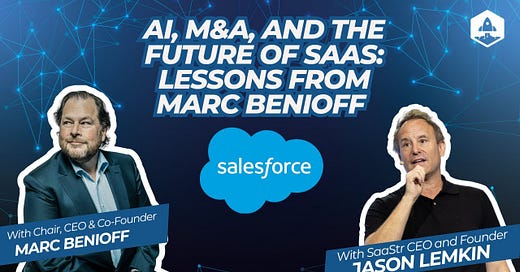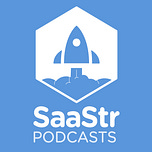"The Last Generation of Human-Only CEOs: Marc Benioff's Bold Vision for the AI-Augmented Enterprise"
Marc Benioff was kind enough to join SaaStr for the first time to do a truly deep dive on what AI means in business software today. From how quickly humans will be replaced in some functions ... to how slow some traditional enterprises will be to change.
It's a good one.
Top 5 Unexpected Learnings:
1. Human + AI + Executive Teams Are The New Normal
Marc Benioff revealed he's been working with AI agents for nearly three years, particularly when creating his V2MOM documents (Vision, Values, Methods, Obstacles, Measures). For these important strategic documents, he now has a three-party approach: himself, a Salesforce executive, and an AI agent working together.
The AI asks critical questions about competitive positioning, distribution expansion, and ecosystem impact – often providing insights Benioff hadn't considered. This collaborative approach is delivering superior strategic thinking beyond what either humans or AI could produce independently.
2. The Last Generation of "Humans-Only" Leadership
Benioff believes current leaders represent "the last generation of CEOs that only had human employees." This isn't just a catchphrase – Benioff actively works with AI agents daily to improve Salesforce and trains his employees to do the same.
He sees the human+agent partnership as consciousness-expanding, providing deeper insights and a form of "enlightenment" for executives. The fundamental concept of agent-augmented executive teams is completely reshaping how decisions are made.
3. AI Budgets Are a Red Flag
Where are AI budgets are coming from? Benioff shared a surprising perspective: having a separate "AI budget" might indicate you're heading in the wrong direction.
He believes AI investments should come directly from line-of-business budgets, with business unit leaders held accountable for efficiency, productivity, and employee augmentation through AI. Organizations with isolated AI teams and budgets aren't properly integrating AI into core business operations.
4. The Four-Layer Enterprise Stack
Benioff vision’s for the enterprise stack of the future: four integrated layers: 1) Apps (still critically important), 2) Data (more important than ever), 3) Agents (the AI layer), and 4) Robotics (the emerging physical manifestation layer).
This four-layer vision is becoming the architectural blueprint for Salesforce's entire platform direction, with remarkable convergence in real-world implementation.
5. Agent-First Companies Will Dominate
Benioff sees both an entirely new class of "agent-first" companies that will fundamentally differ from today's organizations. And existing leaders being radically remade that will look much different from how they do today.
He expresses a hint of envy toward founders who are starting companies today because they can build agent-first organizations from the ground up rather than transforming existing ones. This suggests a profound competitive advantage for new entrants who design their entire business model around AI augmentation from day one.
The Practical AI Transformation at Salesforce
"Agents can only go so far without the data and apps. And this is where Salesforce wins with AI. The data is more important than ever. Or your agents just can't perform at the level of accuracy We need them to."
The Real Impact of Salesforce's Agent Force AI
Benioff is particularly excited about Agent Force, which began as a concept a year ago and is now deployed by about 5,000 companies. What's unique is how quickly customers are seeing value – far faster than traditional enterprise software implementation cycles.
One standout example is Singapore Airlines, whose CEO is building an agentic layer over the entire airline. This was particularly motivating for Benioff, seeing how rapidly customers can deploy high-value AI implementations in relatively short timeframes.
Salesforce itself has deployed AI agents extensively, with 9,000 support agents already conducting over half a million AI-augmented customer interactions.
Contact Center Transformation Is Leading the Way in AI
The contact center is at the bleeding edge of AI transformation. When asked about reports of 30% headcount reductions in many contact centers within just one year due to AI replacing human headcount, Benioff confirmed he's exploring similar efficiencies at Salesforce. However, he cautions that large-scale workforce changes take time at many older enterprises and at true enterprise scale. For every early adopter they are seeing at Salesforce, many enterprises are still taking their time to watch and learn.
Benioff references the famous phrase that "people overestimate what will happen in a year and underestimate what will happen in a decade" with respect to AI workforce transformation. He sees the contact center transformation as just beginning, with early pioneers showing the way but mainstream adoption still in process.
AI Without Data and Apps is of Limited Value: AI Bringing Value to Disney Castmembers
So much of the power in AI will be more platforms like Salesforce because they have massive amounts of data.
"Agents can only go so far without the data and apps. And this is where Salesforce wins with AI. The data is more important than ever. Or your agents just can't perform at the level of accuracy We need them to."
Strategic Customer Implementations
Lennar, one of America's largest homebuilders, exemplifies successful AI implementation. After attending Dreamforce, their team conducted an internal hackathon focused on Agent Force, developing five high-impact use cases that are now dramatically affecting the company's financials.
What's notable is the speed of implementation – from idea to innovation to live deployment took only six months. And this is just the beginning of Lennar's agent-first transformation.
Meeting Customers Is Still The Ultimate Motivator
Marc is still always meeting customers. Meeting the King of Bhutan and seeing he uses Slack? "Now That's Motivating".
Salesforce's Evolution and Strategic Vision
The Power of Integrated Acquisitions
Benioff discussed the performance of Salesforce's major acquisitions, which are showing impressive growth despite being several years post-acquisition:
Mulesoft: 22% growth
Tableau: 16% growth
Slack: 17% growth
For Slack specifically, Benioff noted a strategic shift in their distribution model – allowing all Salesforce representatives to sell it and receive quota credit, essentially making it a pure product with the rest of their portfolio. This change "supercharged" Slack's performance.
The recent Tableau user conference showcased a completely new product that combines apps, agents, and AI for the "data fam" community. Benioff expressed particular excitement about this transformation, as there were aspects of Tableau he "always wanted" that are now being realized.
The Data Advantage
Benioff emphasized that many underestimate the data requirements for effective AI implementation. Salesforce has 230 petabytes of data and also federates data from Snowflake (where Salesforce was a core investor), Databricks, BigQuery, S3, and other sources.
This federated data layer creates a "consistent data layer" that allows AI agents to operate effectively at enterprise scale. While startups might take a "see a bear, shoot a bear" approach with targeted AI solutions, Salesforce is focused on helping enterprises get their data together first, then deploying next-generation apps, and finally implementing agents at scale.
Data Cloud has been Salesforce's fastest-growing product ever and will be their "fastest multi-billion dollar product ever," indicating the market understands this data-first approach to AI implementation.
The Human Impact and Salesforce Values
Work Reorganization vs. Reduction
In healthcare, Benioff sees AI not necessarily reducing staff but enabling "more value-added" work. Medical professionals are overloaded and burned out, and an agentic layer could handle routine patient inquiries, pre/post-operative care guidance, and procedure preparation information.
The key insight is that medical centers might not have fewer people a year from now but will use their highly-trained staff in more valuable ways – similar to what Salesforce is experiencing with their own help.salesforce.com implementation.
The Enduring Importance of Corporate Values
Despite Salesforce's massive growth to over $40 billion in annual revenue, Benioff stressed the enduring importance of the company's 1-1-1 model (1% equity, 1% profit, 1% employee time) committed to philanthropy. Established 26 years ago at Salesforce's founding, this model has now generated 10 million volunteer hours, supported 50,000 nonprofits and NGOs on their platform for free, and delivered nearly $1 billion in donations worldwide.
Maintaining these values while scaling remains a "huge challenge" that Benioff believes companies should be held accountable for – whether related to trust, customer success, innovation, equality, or sustainability.
Top 4 Mistakes Marc Made
1. Keeping Acquisitions Separate Too Long
With Slack, Benioff admitted they initially tried to "keep it how it was" – running it as a separate company, investing in its sales team, and maintaining its independence. However, growth truly accelerated only after they "hit the button" and fully integrated it with their platform and sales organization. This suggests a mistake in not integrating acquisitions more aggressively from the beginning.
2. Underestimating Implementation Timelines
Benioff referenced the reality that "people overestimate what you're going to do in a year" regarding AI transformation. Despite his enthusiasm, he acknowledged that large companies like Salesforce face significant challenges in making material changes to their operations with AI in the short term. This suggests early timelines were too optimistic.
3. Not Leading With Practical AI Solutions Sooner
When discussing AI budgets and implementation, Benioff noted that "for the vast majority of companies" who've been experimenting with AI models and tools over the past 3-4 years, "they've mostly failed." He attributed this to a lack of practical, specific, tactical approaches. This implies Salesforce itself may have initially pursued too many experimental AI projects before focusing on practical implementations like Agent Force.
4. Not Moving Faster On Data Integration
Benioff acknowledged a "broad misunderstanding of data" that he plans to "clear up" at Dreamforce. Despite Salesforce's 230 petabytes of data, the critical importance of data federation and integration for AI success suggests this should have been prioritized earlier in their AI journey. The emphasis on Data Cloud as their fastest growing product ever indicates they may have initially underestimated how central the data layer would be to AI success.













Share this post